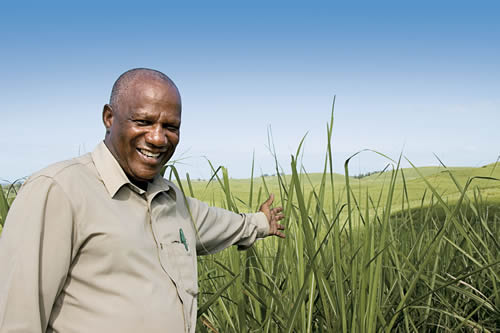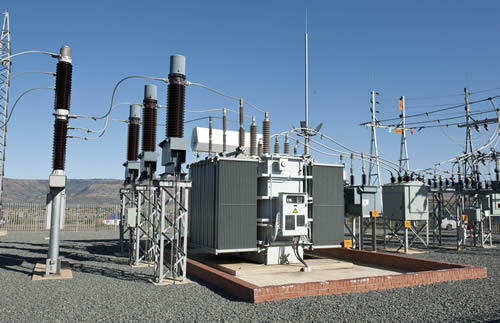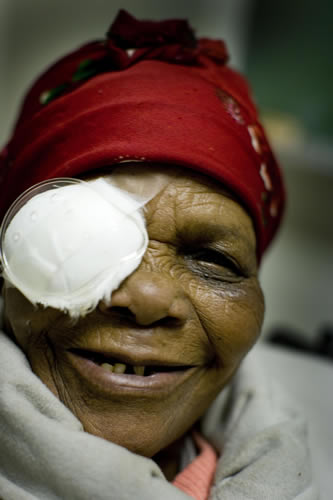Jun 2017 2nd Edition
Jun 2017 2nd Edition Estelle Greeff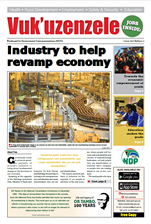
Translations
Amahlathi CWP helps community
Amahlathi CWP helps community Estelle GreeffAdvertorial
The Amahlathi Community Work Programme under the Department of Cooperative Governance and Traditional Affairs is helping people’s dreams become reality.
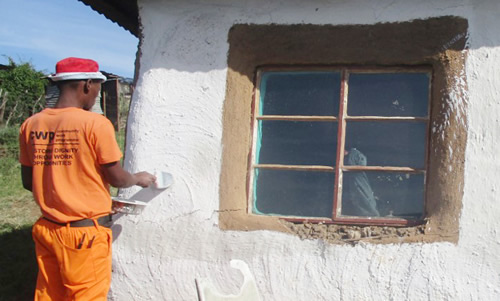 From a young age, Masixole Magwevana had a dream of becoming a paramedic. Today his dream is a reality, thanks to the Community Work Programme (CWC) in Keiskammahoek, Eastern Cape.
From a young age, Masixole Magwevana had a dream of becoming a paramedic. Today his dream is a reality, thanks to the Community Work Programme (CWC) in Keiskammahoek, Eastern Cape.
Keiskammahoek is a rural town in the Amahlathi Local Municipality, one of the seven local municipalities that make up the Amathole District Municipality.
In an effort to uplift the poverty-stricken town, the Department of Cooperative Governance and Traditional Affairs (CoGTA) established a CWP site there in 2009.
The aim was community development, poverty alleviation through work opportunities for the poor and unemployed, and the facilitation of positive family changes.
The site, implemented by Siyakholwa Development Foundation (SDF) on behalf of CoGTA, started with 12 participants in June 2009. Just a year later the number had increased to 874.
By 31 March 2017, 1 744 participants were enrolled in the Amahlathi site of the CWP, with a further 385 participants having benefited from and left the programme in the previous 12 months.
Magwevana spent five years in the CWP. This opportunity, and mentoring by SDF, allowed him to fulfil his lifelong dream. He is now a qualified paramedic working in Fort Beaufort.
His journey started with working at the CWP for just eight days a month. He then progressed to become a supervisor, getting the training and work experience that allowed him to apply to be a paramedic.
The CWP gives participants much-needed experience, but they do not go home empty-handed. In 2016/17 alone, more than R16-million was paid to Amahlathi CWP participants as wages. This allowed them to both support their families and contribute to the economy of Keiskammahoek.
Vegetable gardens
The Amahlathi CWP not only gives participants skills to start careers, it also helps uplift the community.
The Nutrition and Food Security Support programme is carried out in partnership with the Nelson Mandela Metropolitan University (NMMU) and Bountiful Grains. Supervisors and participants are trained to develop and maintain vegetable gardens and the compost piles that fertilise them.
Communities are trained to plant the gardens – without ploughing – at schools, crèches, hospitals, orphanages and old-age homes. The compost piles allow them to plant without chemicals, to ensure environmental sustainability.
Peach, citrus and other fruit trees have also been successfully planted. Women have been trained in jam-making and bottling. The programme has also introduced a beekeeping project, to help people start a honey business.
Saving soil and water
Another initiative, also in partnership with NMMU and Bountiful Grains, is planting vetiver grass to prevent soil erosion and building stone check dams to reclaim soil lost to dongas.
A nursery now grows out 10 000 vetiver plants a year to stock new areas. This labour-intensive project conserves water and nutrient-rich soil on communal lands. The removal of thirsty wattle plants from waterways also helps save water.
Maintaining community assets
The CWP performs even more services for the community. Participants have painted the SS Gida Hospital, the Lower Gxulu Clinic, and the primary schools of Sivuyile, Rabula and Masincedane. They have also fenced the main graveyards in Keiskammahoek. This all contributes to an aesthetically improved community infrastructure.
Villagers are also repairing and constructing mud and wattle crèches. New brick and mortar crèches have been built recently, while some villages have cleaned and constructed dams, fixed and built bridges, and repaired school infrastructure.
A community hall at Tshoxa village was completely refurbished by community members through the programme. This maintenance of public spaces and facilities is making Keiskammahoek a more pleasant town to live in.
Support to schools
CWP participants are also fixing furniture at schools in the area. So far they have repaired 3 056 desks, 2 444 benches and 622 chairs.
Over 50 CWP teacher assistants were also trained to run a life skills programme in Keiskammahoek’s 54 schools. The programme warns learners about teen pregnancy, absenteeism and dropping out of school. In addition, more than 1 500 learners have gone through a reproductive and puberty education programme.
Unemployed matric-level young people get the chance to be teacher assistants in schools, and child-headed households get help preparing food.
The programme has also trained 33 mature women to provide social services to children and others. These include support to families affected by HIV and AIDS, help with social grant applications, and combating the abuse of vulnerable community members.
Compost piles and nutrition gardens are also established in schools and crèches, while fencing is done where necessary. Water tanks have been installed at crèches and schools, the grass cut regularly and security supplied.
Magwevana is not the only CWP participant to realise his dreams. Sibabalwe Tywabi is another. After starting at the CWP, Tywabi showed great potential and was eager to attend as many of the CWP training sessions as he could.
The training allowed him to develop and gain work experience. After spending time as a supervisor, he focused on training and mentoring other participants.
In 2014 he went for a successful interview at SS Gida Hospital. He is now a full-time pharmacy assistant at the hospital, and studying to become a qualified pharmacist. This would never have been possible without the CWP.
BRICS forum helps market Africa
BRICS forum helps market Africa LondekileInternational relations
South African government officials and business representatives held wide-ranging talks with their BRICS counterparts during the annual St Petersburg International Economic Forum.
The St Petersburg International Economic Forum (SPIEF) is an annual Russian business event that brings together BRICS governments (Brazil, Russia, India, China and South Africa) and the business community.
Discussions cover issues facing BRICS economies, including investment opportunities.
Bulelani Magwanishe, Deputy Minister of Trade and Industry, represented South Africa at the forum that began on 1 June.
The deputy minister said the discussions and networking that took place represented a great marketing tool for South Africa and African development.
Educating investors
“Certain countries still do not know much about Africa’s economic activities and projects.
“The continent needs to do a lot of marketing to show its potential and focus on helping the facets of our economic activities, like Russia and China do,” he said.
South Africa sees SPIEF as an opportunity to educate potential investors about the opportunities across the continent.
During the BRICS Business Forum and Russia-Africa Round Table, South Africa pushed for more investment in industrial projects to drive the African Union development agenda.
The $35-billion worth of new contracts signed during the forum was evidence of its importance, the Deputy Minister explained.
“Inroads were also made in creating new markets for agro-processing and mining sectors, especially for emerging exporters and entrepreneurs for the East Asian markets,” said Deputy Minister Magwanishe.
Creating new platforms
An important lesson taken away from the forum by the South Africa delegation was the need for African governments to create a similar event for the continent.
Among the 5 000 delegates in attendance were 39 ministers from 26 countries, all of whom were looking to showcase or find investment opportunities.
The Deputy Minister explained: “Africa should also move in the direction of creating platforms such as SPIEF in order to capitalise on some of the largest untapped reserves of minerals, oil and gas.”
Brighter future for SMMEs in Mpumalanga
Brighter future for SMMEs in Mpumalanga Estelle GreeffSmall businesses stand to benefit from a Mpumalanga government investment of more than R1-billion over the next five years.
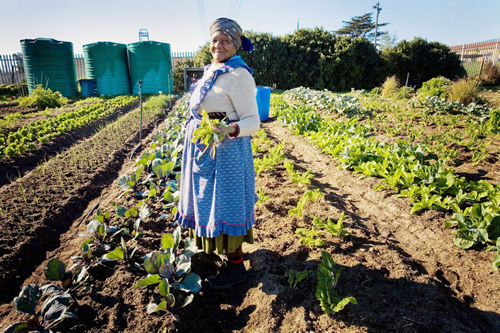 Mpumalanga means “place of the rising sun”, and a new programme announced in the 2017 provincial budget will make it brighter for local small, medium and micro enterprises (SMMEs).
Mpumalanga means “place of the rising sun”, and a new programme announced in the 2017 provincial budget will make it brighter for local small, medium and micro enterprises (SMMEs).
Delivering the provincial Department of Economic Development and Tourism budget, Member of the Executive Council (MEC) Eric Kholwane said SMMEs and cooperatives are critical vehicles for transformation in the province. For this reason, the province has set aside R10-million in this financial year to help grow these small businesses.
The province will begin by revising its procurement regulations to support the growth of small businesses and cooperatives.
“To bring meaning to radical economic transformation, the nutritional needs of government departments and entities should be served through a new model that will support the development of agriculture in the province.
“An amount of R10-million has been set aside to support SMMEs and cooperatives in the implementation of this nutrition programme,” the MEC said.
Mega development
The Mpumalanga Economic Growth Agency (Mega) will coordinate the funding with an emphasis on housing, roads and transport infrastructure.
Last year Mega approved loans worth R83.6-million to 61 entities in manufacturing, food services, property development, mining and agriculture sectors.
In its coordinating role, the agency will be able to link multiple SMMEs to work together on major projects in the province.
In the 2017/18 financial year Mega will disburse loans valued at R45-million and facilitate loans amounting to R80-million, the MEC announced.
This is just the beginning of provincial investment in growing the small business sector. As the MEC pointed out, small business can be the engine of growth.
“We expect to disburse in excess of R1-billion over the next five years, focusing on the provision of support to SMMEs, cooperatives, agricultural enterprises and home buyers,” MEC Kholwane said.
Businesses specialising in agro-processing, mining, energy, manufacturing, construction, trade, transport, forestry, and government and community services can access funding from Mega. The agency is especially eager to fund housing projects for previously disadvantaged communities.
Business help for tech-savvy youth
Business help for tech-savvy youth JoyYouth Focus
Are you a young go-getter looking to start your own business? Then visit the IDC’s #SAunder36 website, a one-stop shop of advice and financing options for young entrepreneurs.
 A new online portal is opening the doors of business for young entrepreneurs. The Industrial Development Corporation’s #SAunder36 website (www.SAunder36.co.za), described as a “Youth Opportunity Platform”, is a one-stop shop for youth who want access to the formal economy.
A new online portal is opening the doors of business for young entrepreneurs. The Industrial Development Corporation’s #SAunder36 website (www.SAunder36.co.za), described as a “Youth Opportunity Platform”, is a one-stop shop for youth who want access to the formal economy.
The site gives youth the chance to network, get advice, build their business ideas and apply for finance.
Industrial Development Corporation (IDC) public relations manager Mandla Mpangase says it was built to help youth entrepreneurs who want to pursue businesses but do not know where to start.
“The portal has many functions which our youth can utilise for free. For example, you can get advice on how to start a business.
“They can also use the platform to test whether their ideas are feasible. We have business experts to help them with any information they need. Our experts have walked the walk and know the challenges faced by youth entrepreneurs.”
Innovation
Mpangase says development finance institutions like the IDC have to find innovative ways to market their services.
“Our youth are technology savvy. They want to know what the IDC has for them at the click of a button.
“The objective of the portal is to move us away from the conventional into the more interesting social media marketing space. Another interesting aspect of the portal is that it will be managed by youth,” says Mpangase.
Billions in finance
IDC chief executive Mvuleni Qhena says youth participation in the formal economy is an important part of the corporation’s strategy.
“Over the past three years, the IDC has committed more than R1.2-billion in support of youth-owned businesses, and we are making an additional R4.5-billion available during the next five years,” Qhena says.
“Access to funding is one of the major stumbling blocks for new businesses. The IDC’s mandate is stimulating the economy, so we are able to take a more patient approach and, within specific funding schemes, offer preferential lending rates compared to commercial banks.
“We want to help businesses grow so that they can not only support the founders, but flourish in order to stimulate jobs. We take these businesses under our wing to ensure they receive all the necessary non-financial support to help them achieve success. Ultimately, our success is measured by the success of the businesses we fund.”
Qhena says in order for South Africa to address the tremendous challenge of youth unemployment, initiatives such as #SAunder36 have to be matched by others.
“I put this challenge to our partners in the private and public sector – let us join hands to actively seek workable solutions. And to the youth – your responsibility is to work tirelessly to improve your skills so that the business sector looks forward to employing you due to the knowledge, confidence, energy and value you will bring to their business.”
Business visitors will boost tourism
Business visitors will boost tourism LondekileNational government has committed to growing South Africa’s tourism industry. Over the next five years, they want to have 5-million guests visiting the country.
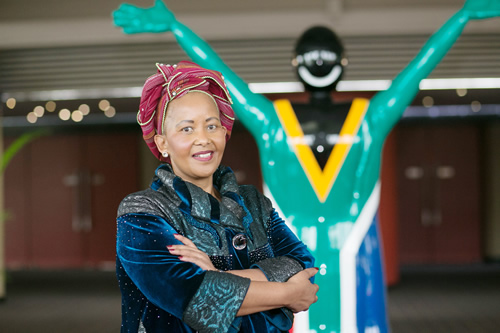 Speaking at the 2017 Southern Africa Association for the Conference Industry Congress (SACCI), Tourism Minister Tokozile Xasa said tapping the market of the one million business people who visit South Africa for conferences every year was the way to reach that target.
Speaking at the 2017 Southern Africa Association for the Conference Industry Congress (SACCI), Tourism Minister Tokozile Xasa said tapping the market of the one million business people who visit South Africa for conferences every year was the way to reach that target.
Word of mouth marketing
“The business event delegates that we host annually return home to sell our country to others by word of mouth, and indeed, many will return here on holiday and some may consider investing in South Africa.”
The average business traveller spends seven days in South Africa, with five of the days spent attending a business event.
Minister Xasa noted that the International Congress and Convention Association (ICCA) continues to rank South Africa as the top business events destination in Africa and the Middle East.
“We are also one of the world’s top 10 long-haul destinations for hosting international meetings and conferences.”
In 2016, South Africa hosted 125 ICCA-recognised international and regional association conferences.
Expanding beyond major cities
The direct economic benefits of hosting such conferences includes what delegates spend on hotel accommodation, food and beverages, and souvenirs.
Minister Xasa added that South Africa needed to look beyond major centres to improve the options for conference organisers.
By ensuring the quality of products and services are of a high standard, smaller venues can bid for small conferences.
“This will help to improve the geographic distribution of tourism beyond the major centres, and spread the wealth generated by these events more equitably.”
In 2016, International and Regional Association meetings were held in Rustenburg, Ladysmith, Mbombela, Phalaborwa, Skukuza, Bloemfontein, Somerset West and Stellenbosch.
Centenary celebration of Oliver Tambo
Centenary celebration of Oliver Tambo JoyOR Tambo addressing the Conference of the Women’s Section of the ANC in 1981: “The mobilisation of the women is the task, not only of women alone, or of men alone, but of all of us, men and women alike, comrades in struggle.”
Communities restock libraries’ shelves
Communities restock libraries’ shelves Estelle GreeffResidents of Mogale City have started a new chapter in the drive to promote a love of reading.
 The West Rand mining town, also known as Krugersdorp, is being brought to book by local ward councillor Trudie Naude. She is determined to ensure that local libraries are well resourced and that the culture of reading is sustainable.
The West Rand mining town, also known as Krugersdorp, is being brought to book by local ward councillor Trudie Naude. She is determined to ensure that local libraries are well resourced and that the culture of reading is sustainable.
“People expressed to us as the leaders in this town that they had pretty much read all the books in their libraries and that not many new books were coming in.
“As a local ward councillor, I took it upon myself to extend a helping hand and do my bit by sending out a plea to residents of the town to donate books that they no longer need.
“The response has been nothing short of amazing.
“People literally came from all over to donate a book or two,” says Naude.
Many of the books are already on the shelves of various local libraries, while others still need to be indexed before they can be sent to those libraries that are the most in need of books.
Naude says she has received over 10 000 books of all genres since the project’s launch in April.
UniCollege marketing manager Natalie Franklin says that the institution jumped at the opportunity when they read about the initiative. She says that for them, it was a chance to change lives through education, which is something they value the most as an institution.
“We encouraged our learners to get involved in this initiative and explained to them that there are a lot of people who don’t have access to smart phones, let alone books, and that they, too, need the opportunity to read and educate themselves beyond the schooling system.
“We work in education so we truly understand how important good reading skills are. The response from our learners was amazing. We’ve received over 300 books that we’ve donated to Trudie.
“It’s an ongoing thing so we are still going to donate more,” says Franklin.
Those who want to donate reading material are urged to contact Trudie Naude on 082 657 6211 or email her on Trudie.Naude@icloud.com
Cricketer Kagiso Rabada is world’s number one!
Cricketer Kagiso Rabada is world’s number one! LondekileSouth African cricketer Kagiso Rabada has been named the world’s best bowler in one-day international (ODI) events by the International Cricket Council.
 Rabada recently bowled out four batsmen for only 39 runs during a match against England. This achievement moved him up four places on the ICC rankings to land on the top spot on the ODI bowlers’ list.
Rabada recently bowled out four batsmen for only 39 runs during a match against England. This achievement moved him up four places on the ICC rankings to land on the top spot on the ODI bowlers’ list.
At 22, he is also the youngest top-ranked bowler in the ICC rankings in almost 20 years. Last year the fast bowler became the first cricketer to win six awards at Cricket South Africa’s annual dinner, including the prize for Cricketer of the Year.
Minister of Sport and Recreation Thulas Nxesi South Africa congratulated Rabada on his amazing accomplishment.
“To be ranked number one on the ODI cricket rankings its a huge achievement, especially when this occurred while playing in the foreign international platform. This demonstrates tenacity, courage and determination.
“I take this opportunity as well to congratulate the Proteas as they continue to represent us well.”
Rabada replaces another South African, leg-spinner Imran Tahir, at the top of the rankings. Tahir is now in second place.
Education makes the grade
Education makes the grade JoyResearch is showing that the performance of South African learners is on the rise, Minister of Basic Education Angie Motshekga noted during her recent budget vote.
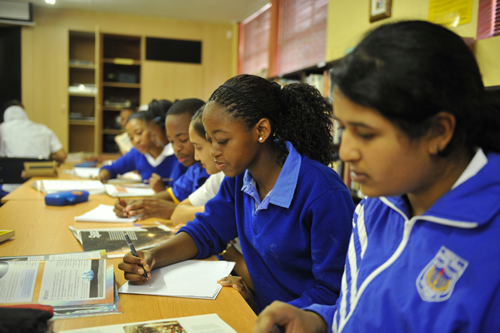 Basic education “is definitely a system on the rise”, Minister of Basic Education Angie Motshekga told Parliament during her budget vote recently.
Basic education “is definitely a system on the rise”, Minister of Basic Education Angie Motshekga told Parliament during her budget vote recently.
The Minister quoted from the National Development Plan, which states: “By 2030, South Africans should have access to education and training of the highest quality, leading to significantly improved learning outcomes.” She said her department was prioritising ways of improving the quality of learning and teaching.
Quality education in the early grades is critical to equip schoolchildren for their later years. “We can report with pride that the effects of the interventions in the Foundation Phase are beginning to result in improved learning outcomes.”
Class of 2016 makes history
On the National Senior Certificate (NSC) Examinations, Minister Motshekga noted: “The Class of 2016 recorded the highest enrolment of Grade 12 learners in the history of our country.”
This was borne out in results. “We have recorded NSC pass rates which have consistently been above the 70 per cent threshold,” she said.
She pointed to three research reports that corroborated the upward trajectory of the country’s basic education system:
- A Unesco report published in 2015, revealing that since the advent of democracy in 1994, more learners remain in school up to Grade 12, with research conducted by the department finding that in 2015, close to 60 per cent of young people were successfully completing 13 years of education (including Grade R).
- A research report published by Dr Martin Gustafson in 2016 indicated that in mathematics, about 34 000 learners achieved a mark of 60 per cent or more in the 2016 NSC examinations, while in physical science the 2016 figures showed that 28 500 learners achieved 60 per cent.
- Research conducted by the Department of Education had found that university readiness had become more equitably spread by 2015.
“Improvements at this level of performance are important, as these mean that more learners get to qualify for mathematically oriented programmes at university, and are hence equipped to fill critical skills gaps in the economy.”
Full steam ahead for Port of Durban
Full steam ahead for Port of Durban LondekileTransnet National Ports Authority (TNPA) recently launched its latest tug in Durban.
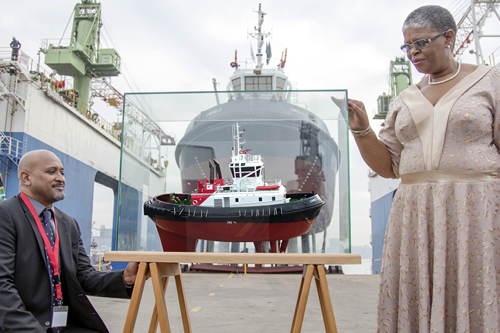 Umbilo is the sixth tug to roll off the South African Shipyards’ (SAS) production line. It is also the first tug to be based at TNPA’s home port of Durban.
Umbilo is the sixth tug to roll off the South African Shipyards’ (SAS) production line. It is also the first tug to be based at TNPA’s home port of Durban.
Umbilo is among four tugs that are being deployed in Durban. Five tugs have already been delivered – to Port Elizabeth, Saldanha and Richards Bay.
In total, nine tugs will be launched as part of Transnet Port Terminals’ R1.4-billion tug-building contract with SAS.
The seventh tug is already in production and the final tug is due to be launched in early 2018.
The SAS contract is the largest ever awarded to a South African company for the building of harbour craft.
The TNPA’s new nine tugs are each 31 m long with a 70 ton bollard pull. Bollard pull is the towing power of a boat.
The tugs also have the latest global technology, making them highly maneuverable.
The nine tugs will be built over three and a half years as part of a wider fleet replacement programme that includes new dredging vessels and new marine aviation helicopters.
Much-needed equipment
TNPA Chief Executive Richard Vallihu said a new tug is exactly what the Port of Durban needs.
“Over the past few years, the Port of Durban has seen larger vessels calling at the port. This has put a strain on our marine fleet. Currently, the port has eight tugs. Four of these are old shuttle tugs with only 32- and 38-ton bollard pull power.”
As a result of the tug shortage, the port has been deploying a five-tug operation to help guide vessels into the port instead of the industry norm of six tugs.
Having a new and powerful tug in the port will release pressure on the port’s marine operations and speed up turnaround times for the vessels calling at the port.
“We can also reduce the cost of doing business and can begin to attract business from elsewhere,” said Vallihu.
He added that the acquisition of the Durban-based tugs are critical to the port’s drive to retain its position as a maritime leader on the continent, especially as it continues to service bigger commercial vessels more frequently.
Modernising the Port of Durban
A number of projects are under way in the Port of Durban to widen, deepen and lengthen berths and improve other port infrastructure to better cater to the needs of the global maritime industry.
The Durban Container Terminal is the biggest and busiest in the southern hemisphere and currently handles 64 per cent of the country’s seaborne container traffic.
The expansion project at the port and container terminals will increase the Durban Container Terminal’s container-handling capacity even further.
The main projects include:
- expanding Pier 1, which aims to increase the capacity of the terminal
- expanding berths 203 to 205
The berths will be deepened from 12.8 metres to 16.5 metres and lengthened from 914 metres to 1 210 metres to enable the Durban Container Terminal to handle three 350-metre vessels simultaneously.
Construction is expected to begin in 2017 and be completed in 2022.
These projects are expected to increase the Durban Container Terminal’s capacity from 3.6-million TEUs to about 5.3-million TEUs. A TEU is the measurement of cargo capacity.
HIV/AIDS community centres to benefit rural areas
HIV/AIDS community centres to benefit rural areas JoyThe Department of Social Development has built 17 community care centres in rural settlements three provinces to support those infected and affected by HIV and AIDS.
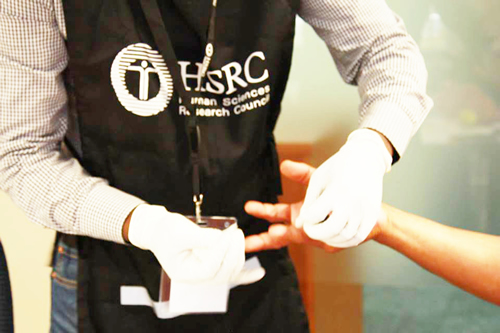 The centres will provide services for orphans, child-headed households and other vulnerable groups.
The centres will provide services for orphans, child-headed households and other vulnerable groups.
Social Development Minister Bathabile Dlamini announced this in her 2017 budget vote recently.
Beyond target
Six of the centres are based in KwaZulu-Natal, another six are in North West and five are to be located in Limpopo.
According Ruth Pooe from the Department of Social Development, the project will go beyond their initial target in terms of services.
“We decided to build the centres in very rural areas where access to integrated social services is minimal.
“Although initially designed to cater for those infected and affected by the pandemic, we decided that the centres should be designed to provide comprehensive social services to the communities.
“These will range from providing protection, care and support services and psycho-social support services to having youth development programmes and feeding schemes, as well as starting up food gardens for the locals.
“This is because we want to be in a position where not only do we assist those who are vulnerable in communities but also equip them with necessary skills.
“These skills will allow them to make a meaningful contribution to society through our income-generating projects such as the food gardens,” said Pooe.
She added that although the centres will be in three provinces, they will be placed in different districts within the provinces, to ensure they are accessible to community members.
Services for rural areas
The Department of Social Development will also accommodate facilities other government departments such as home affairs and health, extending their reach into rural areas.
The department has received financial assistance from the German Development Bank worth R169-million.
The funds will go towards building the centres as well as buying equipment and training the staff who will work at the centres.
While other centres have been completed and handed over for community use, others are still being finalised.
Industry to help revamp economy
Industry to help revamp economy Estelle GreeffGovernment needs to promote greater patterns of economic inclusion to bring about fundamental change in the structure of our economy.
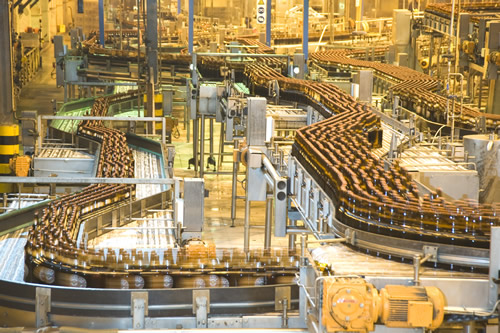 Speaking at the upgrade of the Babelegi Industrial Park, Minister of Trade and Industry Dr Rob Davies said Babelegi should help in turning more entrepreneurs into industrialists and create industrialists who are not just shareholders.
Speaking at the upgrade of the Babelegi Industrial Park, Minister of Trade and Industry Dr Rob Davies said Babelegi should help in turning more entrepreneurs into industrialists and create industrialists who are not just shareholders.
“We need to promote patterns of inclusion for the majority of our people in
activities of the real economy where people will become real industrialists and owners of manufacturing businesses, not just people who are shareholders in someone else’s company or people who are trading shares in one or two ventures
“We need people who have got their own risks, their own involvement and personal enthusiasm and hard work invested in enterprises that produce manufacturing goods.”
The Babelegi Industrial Park in Hammanskraal, Gauteng, is a R42-million project and part of the Revitalisation of Industrial Parks Programme of the Department of Trade and Industry (the dti), which speaks directly to government’s radical economic transformation objectives.
It is the sixth of 10 industrial parks to be revitalised since September 2015.
“The dti has forged strategic partnerships for the implementation of the programme on a national scale, working with the provinces, their agencies as well as municipalities.
“In the case of Babelegi, the department is working with the North West Development Corporation, which owns the park. The City of Tshwane has also played a strategic role in ensuring the smooth implementation of the programme.”
The first phase of the project included upgrading the security infrastructure, the erection of a perimeter fence and installation of guard houses and resulted in 158 people being employed. The building equipment needed was sourced from local businesses.
Housing 181 factories, including multinationals like Nestlè, Babelegi currently employs around 8 500 people but in its prime, offered work to over 25 000. Babelegi has around 260 units available for leasing.
Junior LandCare harvests rewards
Junior LandCare harvests rewards LondekileYoungsters in disadvantaged rural communities are being given opportunities, thanks to the Department of Agriculture, Forestry and Fisheries’ (DAFF) Junior LandCare programme.
The initiative aims to create work by harnessing rural agricultural skills to improve harvests and food security.
Junior LandCare was introduced to empower disadvantaged rural youth through skills development, school nutrition and environmental education programmes. Almost 12 500 young rural students have passed through the programme.
They have worked in labour-intensive projects involving alien plant removal, rehabilitation of wetlands and the building of fences. Transferring of skills is an important goal of the programme. Volunteers receive accredited project management, safe use of equipment and artisan training.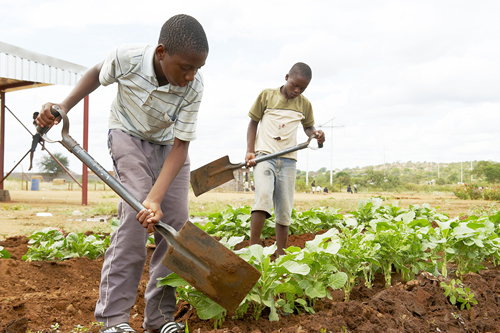
Each year a different province receives the bulk of government support but as the programme has grown, more private companies have chosen to become involved. The programme has expanded beyond schools. Youth club and community-organised projects are now considered for assistance.
As long as the project is a grassroots initiative to find solutions to pressing challenges, the project will be considered.
Volunteers
Junior LandCare is a volunteer programme that encourages young South Africans to play an active role in protecting their environment.
Volunteers identify needs in their own communities. LandCare coordinators then help the group to develop a business plan and request assistance from DAFF. Among the most successful projects are school gardens, new irrigation systems and the installation of JoJo tanks for water harvesting.
Vegetables harvested from the more than 100 school gardens are used to provide hot, nutritious meals to children.
Junior LandCare incorporates in-school programmes, such as school gardens, and out-of-school programmes that see Junior LandCare volunteers working on projects in their wider community. These include training volunteers at youth camps in financial management, health and safety and project management.
Business-savvy graduates have even moved on to become service providers to the programme while the rest have used their training to secure work.
An important factor in the success of the programme has been the “living classroom” idea. Instead of being taught in the dry style of their maths, language and history lessons, Junior LandCare lessons show them the impact their efforts make in their lives.
Please contact Junior LandCare for more information. The Director: Land Use and Soil Management at DAFF Phone: 012 319 7685 Email: dlusm@daff.gov.za
Keeping our kids safe online
Keeping our kids safe online JoyYouth Focus
At the end of the recent Child Protection Week, Deputy Minister of Communication Thandi Mahambehlala called on young people to use the internet to empower themselves. She said it was easy for the internet to become a distraction for the young.
 “Parents buy their children smart phones. Surely we can partner to make the online sphere a safer space for our children. Our future depends on this collaboration. We all have an obligation to raise awareness on the responsible use of the internet. We need to ensure that internet users leave a clean digital footprint online.”
“Parents buy their children smart phones. Surely we can partner to make the online sphere a safer space for our children. Our future depends on this collaboration. We all have an obligation to raise awareness on the responsible use of the internet. We need to ensure that internet users leave a clean digital footprint online.”
Protecting children
The Deputy Minister was speaking at a Child Protection Week event themed “Stronger communities, safer children” in Uitenhage in the Eastern Cape. She spoke to children who voiced their concerns about violence against young girls and women. They also expressed fears about their safety on the internet.
Government cannot, and should not, take the place of parents and communities in protecting children, the Deputy Minister said. The best protection for a child in both the real world and online was committed and responsible parents.
The Deputy Minister was joined by representatives from the Film and Publication Board who shared information with parents, teachers and children on how to enjoy the benefits of the internet safely.
Participants at the event agreed that parents and guardians need to be more vigilant and to continuously monitor the games their children play.
Advice for parents and guardians
- Talk about safety with your children
- Explore online together with your children
- Agree on online rules
- Set family settings on all digital devices
- Ensure digital devices are password protected.
Living conditions in SA improve
Living conditions in SA improve Estelle GreeffMore South Africans have water supplied to their homes, there are fewer bucket toilet systems and more homes have been connected to the electrical grid. There are more children in school and more South Africans have access to affordable primary healthcare.
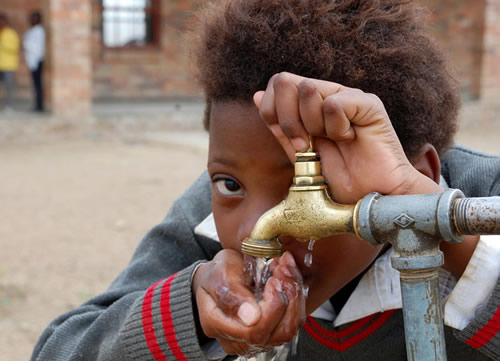 A newly released Statistics South Africa report, the 2016 General Household Survey, shows that life has improved for most South Africans over the years. We are healthier, more educated and there are more households being kept safe from the elements, thanks to government housing.
A newly released Statistics South Africa report, the 2016 General Household Survey, shows that life has improved for most South Africans over the years. We are healthier, more educated and there are more households being kept safe from the elements, thanks to government housing.
The safety net of social grants has expanded with 17 per cent more South Africans accessing grants. In 2003, just 12.7 per cent of eligible individuals received some form of government help. Today, 29.9 per cent of South Africans receive assistance to cover basic expenses. The number of South Africans who go to bed hungry today is 13.4 per cent of the population, less than half of what it was a decade ago.
In a country where unemployment and extreme poverty remain challenges, 44.8 per cent of households receive assistance to keep food on the table and the lights on. According to the report, households from all population groups receive help from government. “More than one-third of black African individuals (32.9 per cent) receive a social grant, compared to 27.2 per cent of coloured individuals, 11.5 per cent of Indian/Asian individuals and 6.2 per cent of the white population.”
An educated and healthy population
More South African children are in school and attend schools that are better equipped and safer. However, the country needs to do more to get school leavers to attend vocational colleges instead of sitting at home.
In 2016, approximately 86.9 per cent of South African individuals above the age of five years who attended educational institutions were in school, while a further 4.8 per cent attended tertiary institutions. By comparison, only 2.3 per cent of individuals attended Technical Vocational Education and Training colleges.
The country is also making advances in early childhood education. About 41.3 per cent of 0- to 4-year olds attend early learning programmes at day care centres, crèches, playgroups, nursery schools and pre-primary schools.
Post-matric vocational education and adult literacy have been identified as areas that still need intervention, especially in more rural provinces. Adult literacy rates in the Northern Cape (89.8 per cent), North West (90.1 per cent) and Limpopo (90.7 per cent), lagged behind the national average of 94.4 per cent.
Government improvements have made the public health system more accessible and, to a large degree, safer than previously. In 2016, 71.4 per cent of households used public clinics and hospitals as their first point of access when family members fell ill or became injured.
Brighter and happier households
The number of South Africans living in homes they call their own has increased from 5 per cent in 2002 to 13.5 per cent in 2016, thanks in part to the RDP programme. And while there are concerns about the quality of a minority of the homes, more citizens have homes.
More homes are electrified or are partly powered by renewable energy. The number of electrified households has increased from 77 per cent in 2002 to 84.2 per cent last year.
There have also been increases in the number of homes that have piped water. Only 3 per cent of households in the country have to fetch water from rivers, streams, stagnant water pools, dams, wells and springs.
Again, rural provinces lag behind in supplying clean piped water directly to homes. According to the findings, “The majority of households in the Western Cape (94.3 per cent) and Gauteng (90.7 per cent) had access to adequate sanitation, while about half those in Limpopo (57.1 per cent) and 67.4 per cent in Mpumalanga had adequate access. Nationally, the percentage of households without sanitation, or with bucket toilets, decreased from 12.3 per cent to 4.2 per cent between 2002 and 2016.”
National HIV survey to shape policy
National HIV survey to shape policy JoyFindings from a survey collecting data about HIV and behavioural trends will shape the country’s health policies.
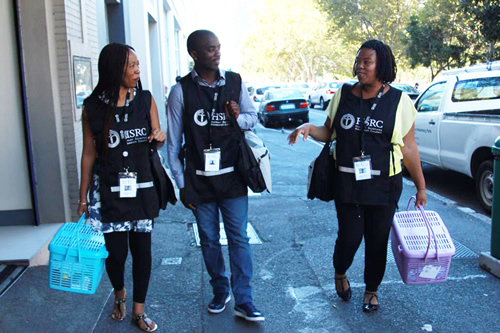 Sixty thousand pre-selected individuals are being encouraged to open their homes to Human Sciences Research Council (HSRC) field workers.
Sixty thousand pre-selected individuals are being encouraged to open their homes to Human Sciences Research Council (HSRC) field workers.
The relevant households have been chosen to be part of South Africa’s National HIV and Behaviour Survey.
The survey started early in December in KwaZulu-Natal.
Researchers have completed 12 000 interviews and are now turning their attention to the Western Cape and Gauteng.
“We thank the many South Africans whose households were randomly pre-selected to participate and their families have gladly accepted to answer the socio-behavioural survey questions and also offered a few drops of blood for HIV testing,” said Professor Leickness Simbayi, Deputy Chief Executive Officer for Research and lead investigator.
Volunteer, it matters
The HSRC is encouraging those chosen to participate even though the study is voluntary. The more people who participate, the more representative the results will be.
“However, a significant portion of the public has been reluctant to take part in the blood sample collection part of the survey. The reluctance is a major concern for the whole team,” says Simbayi.
The aim is to study new infections, count the number of people on antiretroviral (ARV) therapy, and explore resistance to medication. The field workers also ask questions about people’s behaviour and the social factors that put them at risk of HIV infection.
The information will be used to evaluate how well HIV programmes are working. Results are confidential, but if you want to check your status, mobile test clinics will be set up in the areas where the HSRC fieldworkers are conducting the survey.
Findings from the survey will shape the country’s health policies.
“With another four to five months to go in the study, I would like to appeal to all the pre-selected households to offer their full co-operation to our field workers.
Know your status
The Aids Foundation of South Africa says an HIV test reveals if there is HIV in the body.
The test detects the antibodies the immune system produces in response to HIV.
For most people, it takes three months for these antibodies to develop. For a few people, it can take up to six months. During this “window period” of early infection a person is at their most infectious.
Generally, it is recommended that you wait three months after possible exposure before being tested for HIV.
You can be tested for HIV at health facilities such as a local clinic, the offices of a private doctor, a local health department, hospitals, family planning clinics and sites specifically set up for HIV testing. Always ensure that the testing place provides counselling.
The results of the HIV test must be kept absolutely confidential.
Before you take an HIV test you must give informed consent. Ideally it is given individually, in private, in the presence of a health care provider.
National budgets reveal progress and future plans
National budgets reveal progress and future plans JoyFocus on Budget
 The South African government’s achievements and priorities include delivering more services, addressing social challenges, restoring land and transforming the economy.
The South African government’s achievements and priorities include delivering more services, addressing social challenges, restoring land and transforming the economy.
The national government departments recently delivered their budget votes for 2017/18 to Parliament. The budgets revealed the progress they have made so far, and priorities for the year ahead.
Departmental budgets are shaped by the words of the Freedom Charter: ™ South Africa belongs to all who live in it.∫ Each department must allocate funding according to a shared vision of a better South Africa.
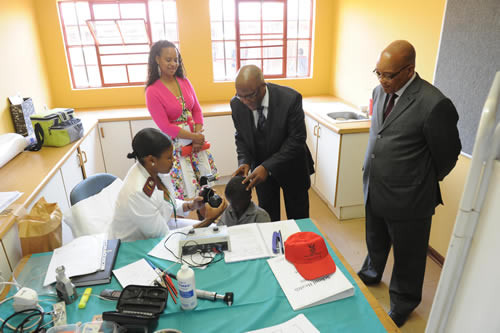 More clinics for National Health Insurance
More clinics for National Health Insurance
In the Department of Health budget vote, Minister Aaron Motsoaledi said the roll-out of the National Health Insurance (NHI) system was making progress.
As part of the NIH, the health department is setting up a computer-based patient information system that will make a person’s health records available at any healthcare facility, anywhere in the country.
The NIH is being implemented in 10 pilot districts. Here are highlights of progress in the pilot project:
- The department has built 34 new clinics and 48 are under construction. This will provide a total of 82 new clinics.
- A further 154 clinics have been refurbished and 192 are being upgraded. This will provide a total of 346 upgraded clinics.
- Since 2012 the department has spent R40-million on infrastructure in the pilot districts and a further R1.7-billion on equipment.
- Outside the pilot districts, 96 clinics new clinics have been built and 132 are under construction – for a total of 228 new clinics.
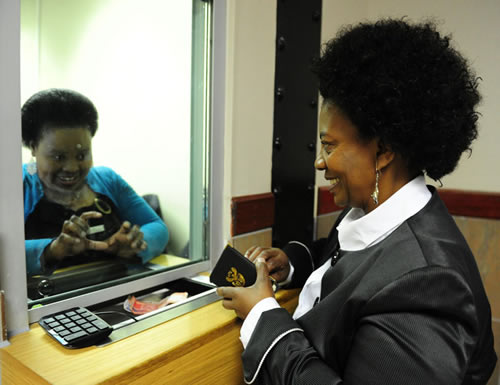 Home Affairs
Home Affairs
- The Department of Home Affairs has issued 6.8-million Smart Card IDs to replace the old green ID books – exceeding its own target by half a million.
- The department now has 279 paperless automated offices for issuing Smart Card IDs, and 115 mobile units countrywide.
- The new National Identity System, replacing the old Population Registry, has been finalised. The NIS is a digital biometrics based system that records the details of all people who live in, and visit, South Africa.
- The department has upgraded facilities at its six largest border posts: Lebombo, Oshoek, Beitbridge, Ficksburg and Kopfontein.
Water and Sanitation
- The Mzimvubu Water Scheme in will create 5 000 jobs during construction and 3 700 full-time positions.
- In Limpopo’s Mopani District, 55 villages have access to piped water for the first time, after a water treatment project in the area was completed.
- In Nganglizwe, Mthatha, upgrades to water treatment plants in the area has allowed the development of a 6 500-unit housing project.
- In Richards Bay, KwaZulu-Natal, a R300-million desalination plant was built and brought online in seven months, at the height of the drought. It supplies water to 175 000 households.
- In the past year, the bucket system has been eradicated in 26 900 areas.
Budget in brief
- Rural Development and Land Reform: 8-million hectares of arable land has been restored to previous owners.
- Sports and Recreation: R690-million budgeted for the healthy lifestyle programme Active Nation, and R225-million for school sports.
- Department of Energy: Responsible for 90 000 jobs and contributes R300-billion to South Africa’s economy.
Energy
An improved Independent Power Producer programme will give black-owned small businesses access to the energy sector.
The department procured 60 000 heating systems for its solar water heater programme, boosting local manufacturers.
Healthcare for the vulnerable
Pregnant women will now get eight free antenatal checkups, up from the previous four visits. During these visits the women will be screened for breast and cervical cancer, and treated if necessary. They will also get advice on contraception.
There is a backlog of 270 000 mainly elderly people waiting for cataract removal operations. The health department will clear this backlog by with 90 000 sight-restoring operations a year.
No choice but to be successful
No choice but to be successful LondekileWhen professional nurse Nomqondiso Mbhalo, 46, started raising chicks she had no idea it would motivate her to start an award-winning business.
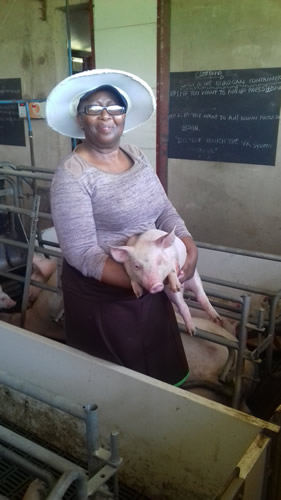 With her husband she owns the 46 hectare Simba Mabhele Farm in Marburg, on the south coast of KwaZulu-Natal.
With her husband she owns the 46 hectare Simba Mabhele Farm in Marburg, on the south coast of KwaZulu-Natal.
Her farm received the Best Commercial Farm Award in the KwaZulu-Natal Department of Agriculture Female Farmer Awards. Simba Mabhele breeds and sells pigs and chickens to the market for meat production, has cows and harvests sugar cane annually.
The farm has 1 225 pigs and 5 000 chickens and on average sells 40 pigs a week and 300 chickens per fortnight. Mbhalo plans to increase the pig cell units from 120 to 400.
Mbhalo, who resigned from her job to start the farm, said: “When we started this farm we didn’t have a start-up capital. We had to sell our home in Vunga and I took my package at work. We invested all that money here. We didn’t have a choice but to make it work. But that money was only for buying a farm. We needed R2-million to build for pigs and chickens.
“Luckily Old Mutual gave us that loan. It is still difficult to maintain the farm as we are still repaying that loan,” she says.
Mbhaolo employs 16 permanent workers and hires 30 casuals for planting and harvesting.
She says that since starting the farm in 2000 she has faced a number of challenges. The main one was buying pig feed. “At first we were planting our own maize – that helps a lot with feeding – but now we no longer planting because of drought. I had to buy food every week for
R60 000,” she said.
Babongile Hlophe, 54, a worker at Simba Mabhele farm, says she enjoys her work because it helps her to provide for her family.
“I don’t have any plans to move. One of my future plans is to start my own piggery as I have gained a lot of experience here. When I started working here, I used to rent. My employer has built me a four-room house for free,” she says.
Mbhalo tells aspiring farmers to be patient. “The farming business is not simple as it looks. You must have patience because you cannot start now and make money tomorrow. It is long process that requires patience and a love of farming.”
Mbhalo said the secrets to success are determination, commitment, exchanging experience with other farmers and a love of farming.
SA to lead Southern African Development Community
SA to lead Southern African Development Community LondekileInternational relations / Africa news
South Africa is set to take over leadership of the 15-member Southern African Development Community this August, for a year-long term as chairperson.
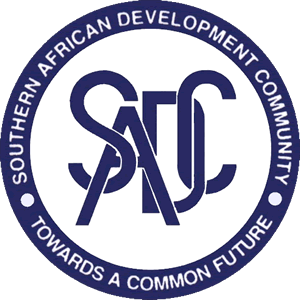 South Africa is set to host 14 of its neighbouring countries in the Southern African Development Community (SADC) at the 37th ordinary SADC summit in August.
South Africa is set to host 14 of its neighbouring countries in the Southern African Development Community (SADC) at the 37th ordinary SADC summit in August.
South Africa was chosen to chair the regional body last year during the 36th ordinary summit in Swaziland.
Accepting South Africa’s role as host of this year’s event, President Jacob Zuma said the country was ready to take over from the previous chair. 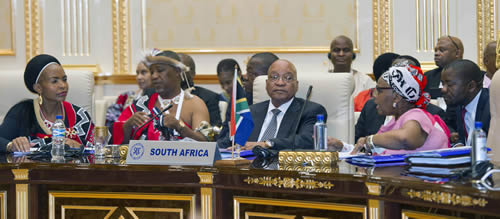
“We are extremely honoured to have been elected as the incoming chairperson of SADC. This is a responsibility we take very seriously.
“We equally wish to affirm our total commitment to carry out this huge responsibility to the best of our ability. We accepted this honour as our contribution to our regional integration agenda.”
The SADC chairmanship is a one-year-term that rotates among the bloc’s member states. From August 2017 President Zuma will take over from Swaziland’s King Mswati III as the chairperson of SADC, for a term that will run until August 2018.
The 37th SADC Summit will be held in Pretoria at the Department of International Relations and Cooperation building on 19 and 20 August.
The main summit will be preceded by other meetings. The Double Troika meeting will take place on 18 August, the SADC Ministerial meeting on 16 August, technical committee meetings on 9 August, and the senior officials, finance sub-committee and finance committee will meet from 11 to 14 of August.
Specialised schools to boost essential skills
Specialised schools to boost essential skills JoyThe Gauteng Education Department’s new school of specialisation recently launched in the Magaliesburg is one of 27 high schools set to improve learners’ hands-on experience in key skills needed to grow the economy.
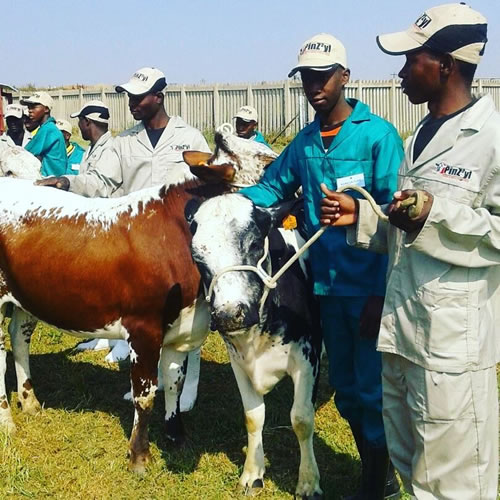 A new specialised secondary school in the Magaliesburg will add hands-on training and experience in to learners’ theoretical education, improving their skills – and their chances of getting a job.
A new specialised secondary school in the Magaliesburg will add hands-on training and experience in to learners’ theoretical education, improving their skills – and their chances of getting a job.
The Magaliesburg School of Specialisation, recently launched by the Gauteng Department of Education, will incorporate subjects in such fields as agriprocessing, agriculture, mining, tourism and veterinary sciences into its curriculum.
The new school was established in partnership with the Department of Higher Education’s Westcol Technical and Vocational Education and Training college and other stakeholders, to help overcome the skills shortage in the region.
Development corridors
Gauteng Education spokesperson Oupa Bodibe said his department planned to launch schools of specialisation in each of the province’s five development corridors. The aim is to nurture talent across key disciplines, injecting sought-after skills into the economy.
“We have decided to rebrand and reorient the technical schools into schools of specialisation where theoretical learning and practical learning are combined, as well as some form of work experience,” Bodibe said.
“This is part of our efforts to ensure that, by the time a learner exits high school, they’ve got tangible skills in their chosen fields, giving them an advantage in the job market.
“They would also be in a position to open a business, go for further studies and join a stream in a technical field,” said Bodibe. At least 27 schools of specialisation will be opened by reorienting some existing schools, he said.
Career opportunities
Located in a region dominated by farming and tourism, the school will major in Agriculture and Hospitality Studies.
The specialised school was converted from an existing school by adding vocational and practical features to it. It has a cattle display, a hospitality display, a vegetable garden, a flower display and a piggery, as well as a display of farm equipment.
Bodibe said the specialisations would be formally implemented in the syllabus for Grades 10 to 12 next year.
“Specialists in the agriculture and hospitality sectors will offer motivational talks that will expose learners to various career opportunities and studies beyond their Grade 12 qualification,” he said.
“Although only learners in Grade 10 to Grade 12 will be exposed to this, those in Grades 8 and 9 will be exposed to a variety of activities linked to the specialisation, while sticking to their current CAPS curriculum.”
Sports role-models honoured by African Union
Sports role-models honoured by African Union LondekileExcellence is not an act but a habit, Minister of Sport and Recreation Thulas Nxesi tells the inspiring audience at the Region 5 African Union Sports Council Awards.
Southern Africa’s top sportsmen and women were honoured at the Regional Annual Sport Awards held recently.
Organised by Region 5 of the African Union Sports Council (AUSC), the awards were held in Kempton Park to honour champions from Angola, Botswana, Lesotho, Malawi, Mozambique, Namibia, South Africa, Swaziland, Zambia and Zimbabwe.
The AUSC uses sport to build relationships and cooperation between African neighbours. It also aims to encourage the participation in sport of women and people with disabilities.
The awards are designed to showcase the best of the region’s sporting talent and recognises not only those that excel on the continent, but those who have lifted the profile of African sports internationally.
The awards recognised African excellence in 11 categories, honouring athletes and teams, coaches, journalists and national sporting bodies who have successfully implemented AUSC programmes.
For the second year, South Africa hosted the event, which drew dignitaries and sport celebrities from across the 10 countries.
While he was honoured to host the event, Minister of Sport and Recreation Thulas Nxesi said it was a bigger honour to have local athletes steal the limelight.
Winners and champions, all
South Africa excelled, winning six of the 11 categories.
Like he did last year, 400m Olympic champion and world-record holder Wayde van Niekerk walked away with the Sportsperson of the Year award. His coach, Anna Botha, received the nod for Coach of the Year.
Other winners were Team of the Year Mamelodi Sundowns, the Confederation of African Football (CAF) Club of the Year for 2016, and Sportswoman of the Year Caster Semenya, the 800m 2016 Olympic gold medalist.
Stanley Mutoya, the chief executive of Region 5, reminded the audience that the awards are about recognising excellence.
“We salute South Africa for their admirable dedication to the African cause,” Mutoya added.
“These awards honour a country that has taken a leadership role in the implementation of the AUSC’s programmes, has well-executed sport and recreation development programmes and represents athletes and teams that are excelling and bringing home medals from international championships and events.”
Journalists win too
Namibia also fared well, taking awards in four of the five categories for which they received nominations, including Junior Female Sportsperson of the year, Sportsman and Sportswoman of the year with a Disability as well as Journalist of the Year for 2017.
“This is for all the women journalists of Africa; this is our time to shine,” said winning journalist Kaino Iyaloo Ndeumono to hearty applause as she accepted her award.
As he wrapped up his welcome on the evening, Minister Nxesi said, “Let me conclude by congratulating the nominees and the award winners – you are all role-models and champions.
“You are living proof of the sentiments expressed by the Greek philosopher, Aristotle, and I quote: ‘Excellence is an art won by training and habituation. We are what we repeatedly do. Excellence, then, is not an act but a habit.’”
TNPA: All aboard for job creation
TNPA: All aboard for job creation LondekileTransnet National Port Authority’s (TNPA) expansion programmes are not only ensuring that South Africa’s ports remain globally competitive and the maritime industry healthy, but that the sector contributes to job creation and empowerment.
Exciting projects underway include the building of nine powerful new tugs, infrastructure improvements at ports and digital initiatives that will culminate in the future introduction of Smart People’s Ports.
Job creation
An immediate job spinner was the awarding by the TNPA of a R1.4 billion tug-building contract to Durban-based Southern African Shipyards (SAS). This is the largest contract ever awarded to a South African company for the building of harbour craft.
SAS chief executive Prasheen Maharaj said his company had created 500 direct and 3 500 indirect jobs through the project.
“We have also committed to ensuring that each tug has a minimum of 60 per cent locally manufactured components, while partnering with international companies on the remaining aspects that cannot be manufactured here, for example the engines and propulsion units,” he said.
Maharaj said the intention was to maximise local content and spread the benefits of the project to black suppliers, including women- and youth-owned businesses. “Ultimately, South Africa will achieve a socioeconomic benefit of more than R800-million as a result of the Supplier Development Plan attached to the contract,” he said.
Skilled staff
TNPA Chief Executive Richard Vallihu agreed that the building of the fleet will help alleviate unemployment while complementing the skills development programme currently underway through TNPA’s Maritime School of Excellence.
“It is essential to have well-trained people in place to support Transnet’s major drive to ramp up infrastructure and efficiency at South Africa’s ports. Transnet has set aside a record-breaking R7.7-billion for training over the next 10 years.
“This will allow us to continue with our skills development drive, focusing on young South Africans who we are developing in various aspects of port and marine operations. These include the tug master who will one day operate the tug fleet and marine engineers who will be tasked with ensuring that the vessels perform to optimal efficiency,” he said.
The port authority will contribute more than R56-billion of capital expenditure under Transnet’s rolling R300-billion-plus strategy to modernise the country's rail ports and pipelines.
Vallihu said ports are catalyst for economic growth.
“By opening up the oceans economy and redistributing the value proposition that the ports offer to a wider range of role players and stakeholders, our ports are playing an incredibly important role in addressing the three scourges plaguing South Africa: unemployment, poverty and inequality.
“This is what we have begun to term as Radical Port Reform and we are pursuing this as TNPA in various ways.”
This month in history
This month in history LondekileAfrica news
Parliament repeals apartheid laws 17 June 1991
On 17 June 1991 the still whites-only Parliament began the process that would eventually abolish apartheid by repealing four oppressive laws. These were the Natives Land Act of 1913, the Population Registration Act and Group Areas Act, both passed in 1950, and the Separate Amenities Act of 1953.
The repeal did not extend the right to vote to all of South Africa’s people. That came later, with the new Constitution. It culminated in the first democratic elections in 1994, which saw Nelson Mandela become South Africa’s first black President.
The repeal of the legal framework was the result of unified opposition by people from all over the world. They collectively put pressure on the white government, lobbied for sanctions, and supported the work of the liberation movements and civil society in exposing the evils of the apartheid system.
Source: South African History Online www.sahistory.org.za
Towards the economic empowerment of youth
Towards the economic empowerment of youth Estelle Greeff
Our democratic system of governance vests legislative authority at the national sphere in Parliament. One of the key responsibilities of Parliament is the appropriation of funds used by government departments to implement programmes and provide services aimed at improving the quality of life of all South Africans. Members of Parliament are also enjoined by the Constitution to hold members of the executive branch of government accountable for how the appropriated resources are used.
At the beginning of every year Ministers table the Budget Votes of their departments before Parliament for scrutiny, debate and approval. Last month, May, Ministers representing 34 government departments appeared before the National Assembly to present our government’s plans to make life better for South Africans.
In their Budget Votes Ministers made a pledge to the people of South Africa that our government intends to spend the taxpayers’ rands to provide houses to those who are homeless, make university education affordable to those from less affording families, and provide support to budding entrepreneurs.
A prosperous South Africa
The President, as the executive authority for the Presidency, presented the Presidency’s Budget Vote on 31 May 2017. This was the last Budget Vote to be presented, underscoring as it did its role as the centre for leadership and coordination of government as a whole, and also its role in galvanising the whole South African society towards a common goal of building a united, non-racial, non-sexist, democratic and prosperous country.
During the Presidency Budget Vote, we announced our annual plans and programmes that will help realise strategic targets and ensure the Presidency delivers on its mandate.
We will continue to provide strategic leadership and coordination of the work of government as well as supervise and monitor the work of all 34 departments.
Youth Month
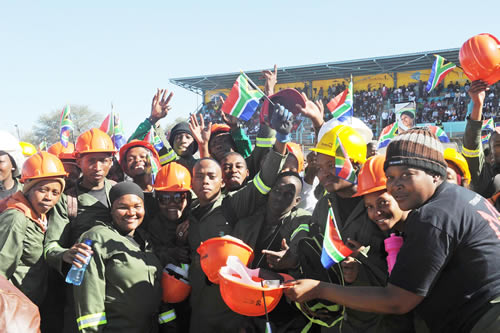 Our government’s primary goal is to make South Africa a better and safe place to live in for all and in particular to improve the quality of life of the poor and the working class.
Our government’s primary goal is to make South Africa a better and safe place to live in for all and in particular to improve the quality of life of the poor and the working class.
Returning on 1 June, the first day of Youth Month in the South African calendar and in response to the debate on the Budget Vote, we said: “Work continues in our quest to build a South Africa without poverty, inequality, unemployment or crime. We want a South Africa without despair, where each person, young and old, has hope of a better future. Achieving a better life for our people includes ensuring the achievement of the country’s vision with regard to safety and security.”
On 2 June at the Sefako Makgatho Presidential Guesthouse in Pretoria, we had an opportunity to meet with representatives of the young people of our country during the Presidential Youth Working Group, convened by the President and supported by Deputy Ministers led by Deputy Minister in the Presidency Buti Manamela.
The meeting reviewed progress made in youth development and discussed challenges facing the youth, including the recent incidents of the killing of women and children as well as ways of ensuring meaningful economic participation by the youth in the radical socioeconomic transformation programme of the country.
Economic empowerment
The Presidential Youth Working Group meeting also signalled the commencement of a number of June Youth Month activities by several government departments, led by the President, which would include the National Youth Day celebration to be held in Tshing township in Ventersdorp, in the North West province, under the theme: “The Year of OR Tambo: Advancing Youth Economic Empowerment”.
For the duration of the whole Youth Month, all Ministers and Deputy Ministers will lead their departments on a number of programmes targeting the youth, focusing among other things on education, skills development, entrepreneurship, small businesses, youth in agriculture, land reform, arts and culture, the environment as well as young people’s participation in the fight against crime, in particular drug abuse, violence and killing of women and children.
The time for developing and preparing our youth for the future is now. We wish you all a productive June Youth Month.
Youth can teach us all to save water
Youth can teach us all to save water LondekileThe recent drought reminds us that water must not be wasted. Both global leaders and South African youth are working to find sustainable ways to save our water, a precious resource essential for the growth of local communities and the national economy.
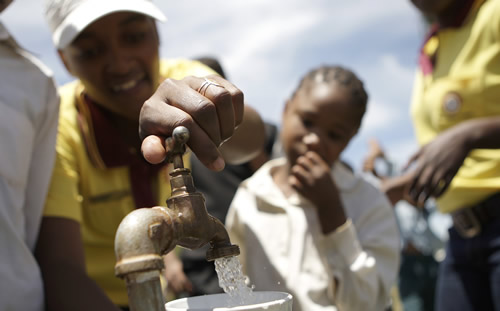 South African is a dry country, always at risk of drought. For us, water is precious and we need to save every drop. The recent countrywide drought is a reminder that we must actively work to make sure water is not wasted.
South African is a dry country, always at risk of drought. For us, water is precious and we need to save every drop. The recent countrywide drought is a reminder that we must actively work to make sure water is not wasted.
For the past 18 years the Department of Water and Sanitation (DWS) has called on young people to join the fight to save water by entering the annual South African Youth Water Prize.
The competition is a creative way to encourage the youth – school children and university students – to research and build prototypes to solve water-related challenges in their communities.
The prize is supported by the national departments of Science and Technology, and Agriculture, Forestry and Fisheries.
This year’s finals of the Youth Water Prize brought provincial winners and past champions to Kempton Park in Gauteng for a week-long programme of excursions, debates and panel discussions.
Sharing knowledge
The competition is part of the 2020 Vision for Water, a DWS programme to educate youth about water management. The idea is that young people will then share this knowledge with their parents, and change the mind-set of their communities.
Past winners have included a project to remove forests of water-hungry invasive trees in the Eastern Cape, a bio-sand water filter, and research on preventing coal dust from power plants polluting water sources.
The overall winner gets to take their project to an international competition in Stockholm, Sweden, during World Water Week.
Deputy Minister of Water and Sanitation Pamela Tshwete said at the opening of the event that the provincial winners were the “best and brightest minds”.
“Since 1999 the department has introduced a number of young people in the water space and these students are spread in the nine provinces. It is important for all us involved in this programme to ensure that it is sustained until all South Africans can talk and live water as part of their daily lives.”
Water is a right
South Africa also recently hosted the UN High Level Panel on Water, to create guidelines for better water management across the world.
At the event, Minister of Public Service and Administration Faith Muthambi pointed out that in South Africa, every citizen has the right to clean water.
“Our Constitution stipulates that water is a human right, while in many countries water is a commodity paid for by all users, even if it is declared a human right.
“South Africa is one of the few countries that have embedded the right to water in its Constitution. The right to clean water is therefore an obligation for government to ensure access at different levels of affordability.”
